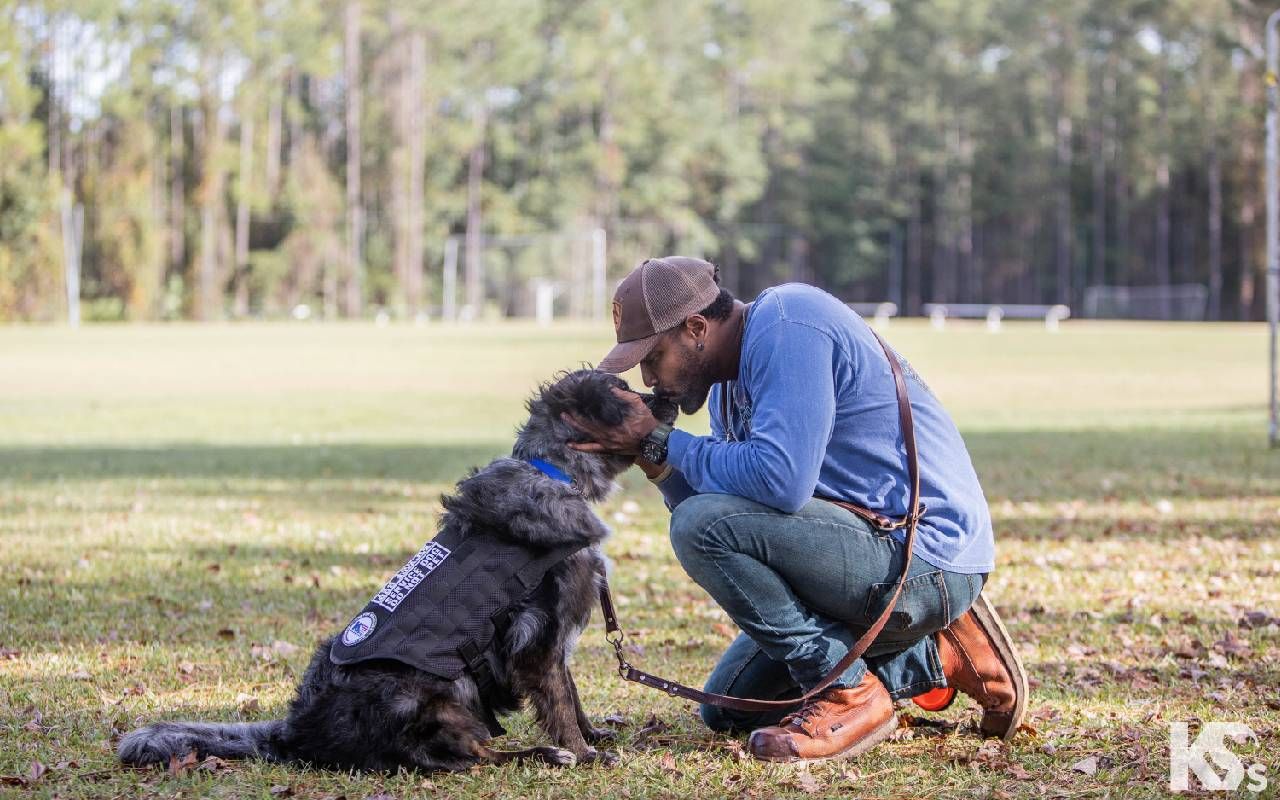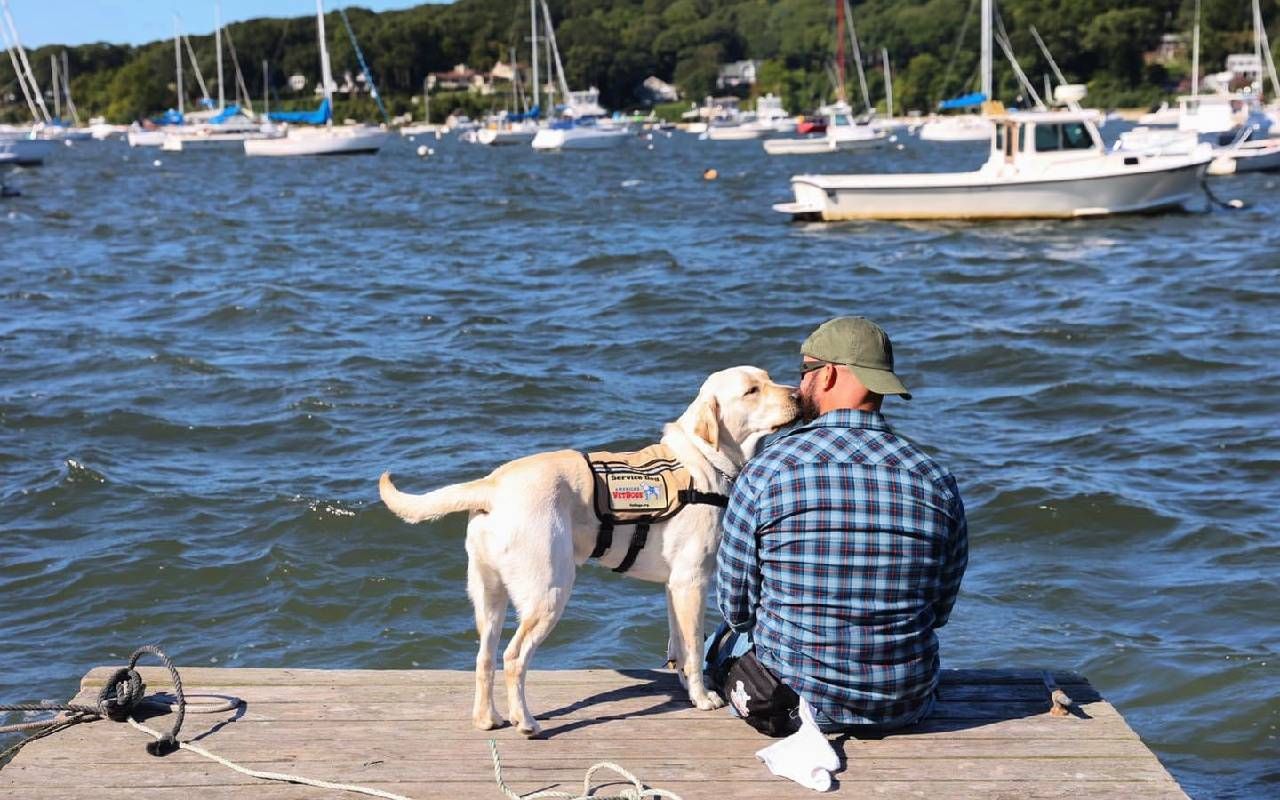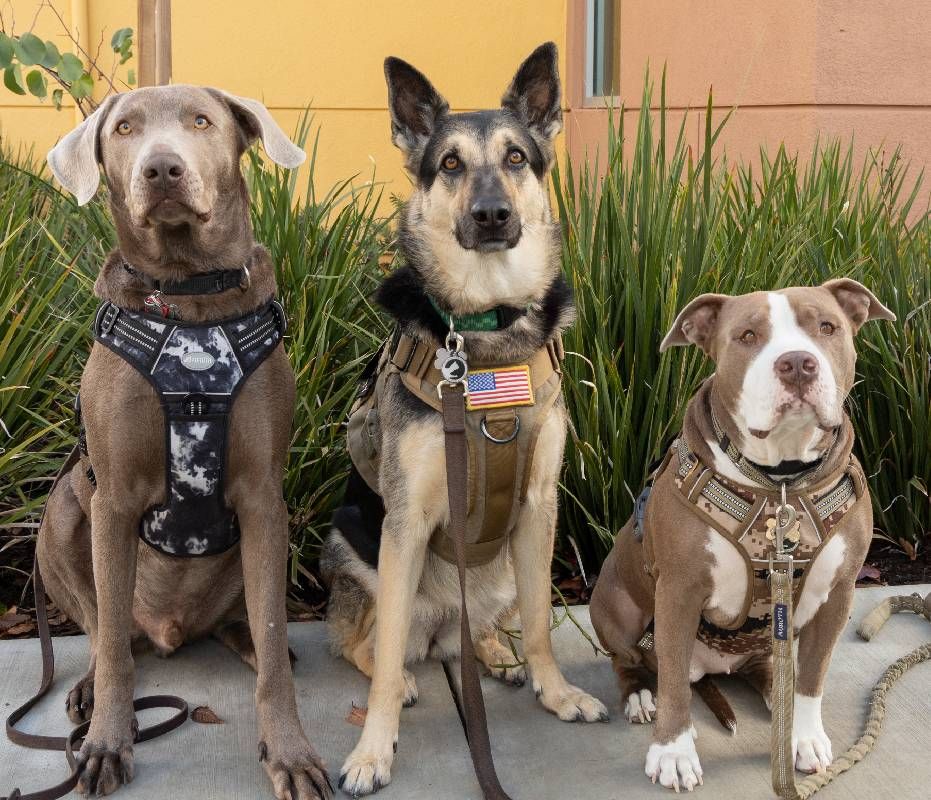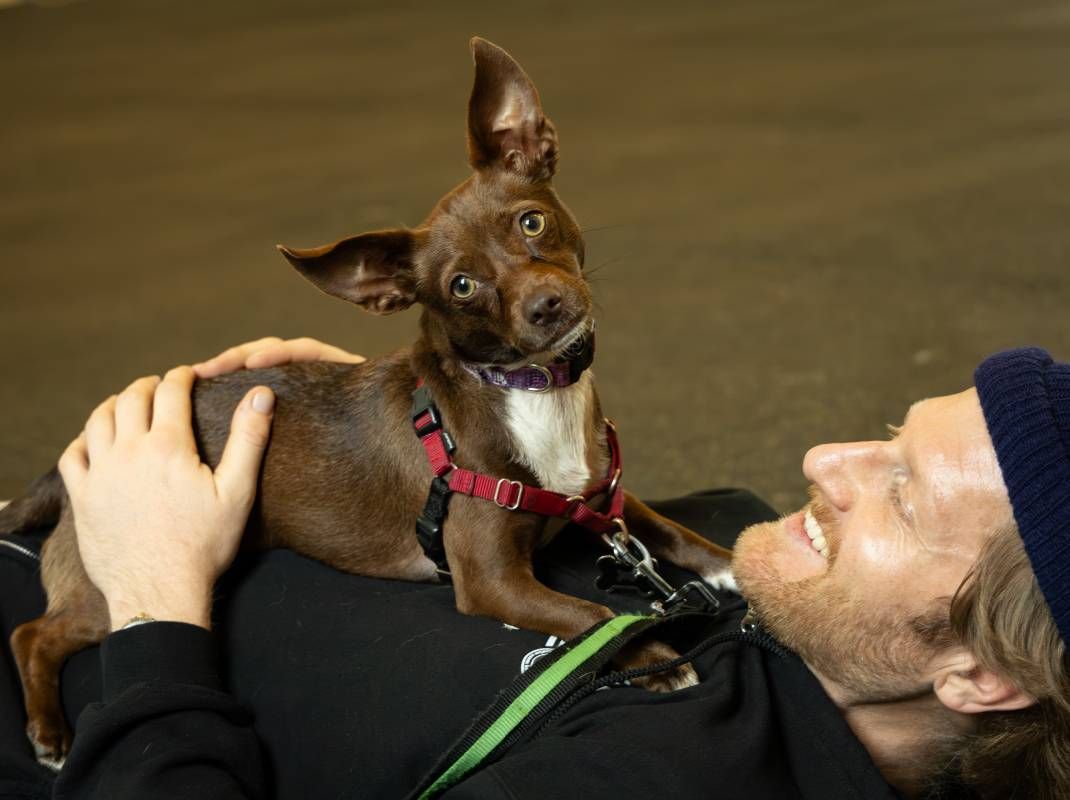Help Vets with PTSD Get Life-Saving Service Dogs
Waiting lists for trained service dogs are often years long; volunteers are being sought to raise puppies and prepare more dogs more quickly
When Army veteran Shawn Burchett spotted a puppy abandoned on the side of a highway in 2022, it changed the course of his life. Burchett and his wife Tricia rescued the pit bull mix, named him Beacon and brought him on their road trip.

Burchett suffers from post-traumatic stress disorder (PTSD) and traumatic brain injury (TBI) from his time in the military, so Tricia looked into nonprofit organizations that help veterans train their pets to become service dogs.
They happened to be driving through Santa Fe, New Mexico, where the nonprofit Assistance Dogs of the West offers such a program. Burchett enrolled in a six-month training course to teach his dog skills like interrupting night terrors, applying deep pressure during heightened anxiety and retrieving medication.
Partner and Protector
It proved so helpful that after only a month, the couple decided to make Santa Fe their permanent home. Burchett credits Beacon with increasing his confidence to enter public places; if he becomes anxious, Beacon will lead him to a quieter space and calm him.
"When I first started training, I never really left my house much," Burchett said. "I definitely would not go to stores unless it was the quietest time of the day or right when they opened or closed.

"Now I can actually go out and feel confident that if I'm going to have an issue, Beacon is there to help me through that issue."
Due to TBI, Burchett's heart rate can fluctuate suddenly, and Beacon learned to recognize when his handler's heart rate starts to get too high or low. That way, Burchett can sit down before he passes out.
"The other thing Beacon does is seizure response, which includes taking my hand and rolling me over by pulling with his mouth," he said. "Or he will lick my face trying to wake me up."
Service Dogs Save Lives
Service dogs like Beacon make significant improvements in lives of military veterans across America, but many more could benefit. According to the U.S. Department of Veterans Affairs (VA), America is home to nearly 20 million veterans, and 9.4% will have PTSD at some point in their lifetime.
"Participants living with a service dog . . . exhibited significantly less PTSD severity as well as less anger, anxiety, sleep disturbance and alcohol abuse symptoms."
The VA's 2023 National Veteran Suicide Prevention Annual Report found 6,392 veterans died by suicide in 2021 (the last year for which the agency has data).
"It will take all of us — working together — to end veteran suicide, and we will not rest until that goal becomes a reality," VA press secretary Terrence Hayes said.
He added that people with PTSD often have additional disorders such as depression, substance abuse, difficulty functioning in social and occupational roles and reduced quality of life.
There's hope. A 2018 pilot study found veterans with a psychiatric service dog experienced clinically significant reductions in PTSD symptoms, including lower depression, higher quality of life and improved social functioning, according to Steven Feldman, president of the nonprofit Human Animal Bond Research Institute (HABRI) in Washington, D.C.
"An additional paper resulting from this pilot study measured salivary cortisol awakening response in the participants, concluding that participants living with a service dog also exhibited significantly less PTSD severity as well as less anger, anxiety, sleep disturbance and alcohol abuse symptoms than those on the waitlist to receive a service dog," he added.
Feldman noted veterans often wait years to receive a service dog — something volunteers can help change.
Puppy Raisers Needed
One of the biggest needs at service dog nonprofits across the country is puppy raisers. These volunteers bring 8-week-old puppies into their homes and expose them to as many positive experiences as possible for around 16 months before they head to advanced training.

Puppy raisers are always needed at America's VetDogs, a New York-based nonprofit that provides service dogs at no cost to veterans, active-duty service members and first responders with physical injuries, PTSD, seizures and vision and hearing loss, according to Lorin Bruzzese, puppy program manager at America's VetDogs (and its sister organization, Guide Dog Foundation).
Bruzzese has personally raised five puppies and said it is fun to bring service-dogs-in-training to grocery stores, movie theaters and sporting events. Plus, the organization offers guidance and pays for all veterinary care and supplies, except for dog food.
"What motivates me is seeing both the dog and the veteran blossom. To serve our veterans is a nice way to give back to them for the sacrifices they've made for the rest of us."
"Our goal is to have a puppy who's just at ease anywhere and everywhere," she said.
There are many volunteer roles beyond puppy raising, according to Barrie Madasu, volunteer services manager at America's VetDogs. For instance, volunteers can join the "Taxi Team" to transport puppies from puppy raiser homes around the country to the nonprofit's New York headquarters, or to veterinary appointments. The nonprofit provides a vehicle and covers gas, tolls and other travel expenses.
Volunteers can also hang flyers recruiting puppy raisers, host fundraising bake sales and toy drives, or join the "Sewing Club" and work from home to stitch mats for puppy crates.
"The volunteers really take pride in making the mats look good," she said. "Especially when quilters donate, they have so many beautiful fabrics."
Stephanie Vogt at K9s For Warriors, a nonprofit that rescues dogs from animal shelters and trains them as service dogs for veterans with PTSD, TBI or sexual trauma at no cost, agreed that the need for volunteers is endless.
Large Support Crew
For instance, volunteers who live within driving distance of the nonprofit's training campuses in Ponte Vedra, Florida, and Helotes, Texas (near San Antonio), can join the "Cooking for Warriors" program to prepare and drop off dinners for veterans staying in "Warrior housing" while they spend three weeks learning to partner with service dogs.
"The Warriors love it because they get a home-cooked meal," she said. "It shows them how the community really cares."

Freedom Service Dogs, a Denver nonprofit, has a dog-breeding program that provides service dogs to veterans and active-duty members of the military at no cost, so it is always looking for volunteers to work in the nursery to observe new mothers and their puppies in overnight shifts, Karen Perez, community engagement coordinator, said.
Volunteers also help socialize the Labrador and golden retriever puppies in the nursery by playing different sounds, turning on special lights, dressing the pups and wearing masks.
"Our volunteers help us get them used to different (stimuli) and build their confidence," Perez said. "From the day after they're born all the way to about eight weeks, we have something new for them every day."
Plenty of Work to Do
Susan Lee Vick, CEO of the animal welfare nonprofit Joybound People & Pets in Walnut Creek, California, said the group's "Shelter to Service Veteran Support" program — which trains shelter dogs to be service dogs for veterans with PTSD at no cost — always needs fosters and other volunteers.
Volunteers can exercise dogs, wash laundry, work on behavior training and serve as "matchmakers" for veterans looking to adopt a pet. (Pet adoptions are free to veterans; research found simply living with a pet dog can alleviate symptoms of PTSD.)
"We expect to nationalize this program and partner with local shelters to help place dogs into becoming 'Shelter to Service' dogs or veteran emotional support animals or pet dogs," she said.
Joybound's 2023 Volunteer of the Year, Sue Andrews, 63, is a retired teacher who donates her labor in several ways, from walking dogs once a week to photographing the relationship between veterans and their service dogs.
"When you see a dog is actually making a difference in that person's life, it just makes you feel so good."
One veteran told Andrews that since partnering with a service dog who can detect oncoming seizures, he's been able to get a full night's sleep, start a job and get engaged.
"What motivates me is seeing both the dog and the veteran blossom," Andrews said. "To serve our veterans is a nice way to give back to them for the sacrifices they've made for the rest of us."
Some service dog programs, such as Assistance Dogs of the West, offer ways for veterans to support other veterans. After training his own dog, Burchett joined that nonprofit's program, in which veterans train service dogs for other veterans with PTSD and people with disabilities. In addition to the therapeutic value of working with dogs, the veterans develop camaraderie and support one another.
The experience provides Burchett with "so much joy and happiness that I thought I'd lost forever."
"We're all veterans. It doesn't matter what branch of service — we've all gone through something and had similar experiences," he said. "And when you see a dog is actually making a difference in that person's life, it just makes you feel so good."
Further Information
If you or someone you know are contemplating suicide, call the free, confidential 988 Suicide & Crisis Lifeline by dialing 988, or visit: 988lifeline.org.
To learn about PTSD treatments from the VA's National Center for PTSD, visit: www.ptsd.va.gov. Veterans at risk for suicide can also download the Safety Plan app by searching "VA Safety Plan" from the Mac App Store or Google Play.
Veterans interested in partnering with a service dog can contact the nonprofit Association of Service Dog Providers for Military Veterans for help connecting with local providers by visiting: servicedogs4vets.org.

